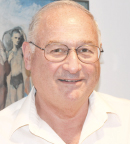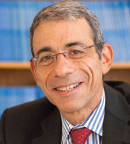
Steven Vogl, MD

Eric P. Winer, MD, FASCO
Steven Vogl, MD, of Bronx, New York, commented that the results after pathologic complete response [pCR] in the I-SPY 2 study are “extraordinarily good,” and Eric P. Winer, MD, FASCO, Thompson Chair in Breast Cancer Research and Professor of Medicine, Harvard Medical School, Boston, said the study “very clearly validates pCR as an incredibly powerful biomarker.”
Dr. Vogl suggested that the excellent results might be attributed, at least in part, to the fact that I-SPY 2 enrolled patients with “more advanced and bulky tumors” than similar studies of pCR by the German Breast Group and the Cancer and Leukemia Group B (CALBG). “If a patient with a big, bulky tumor achieves a pCR, then the cancer must be sensitive indeed to the chemotherapy, so occult metastatic disease would more likely be eradicated,” he said.
“The study provides clear evidence that pCR is a powerful biomarker that helps identify individual patients who have an excellent prognosis,” Dr. Winer added. “But we want to make sure people do not get confused about what this means when we evaluate the results of trials. We have learned over time that a new treatment yielding a higher pCR rate will not necessarily lead to a better long-term outcome than a standard approach producing a lower pCR rate. We have to be very careful about assuming that improvements in pCR [attributed to a new treatment] will translate into a meaningful benefit in disease-free or overall survival.” ■
DISCLOSURE: Drs. Vogl and Winer reported no conflicts of interest.

